By Michelle Sharp
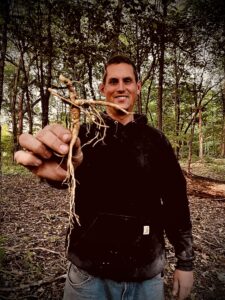 Minnesota soil turns out to have just the right qualities for growing high-quality ginseng.
Minnesota soil turns out to have just the right qualities for growing high-quality ginseng.
Traditionally associated with Eastern medicine, small servings of ginseng are said to promote wellbeing, cognitive sharpness, and strong energy levels.
With over 70 years of combined experience, Tyler Saemrow of Morristown’s Ty’s Ginseng learned to grow ginseng under his grandfather’s tutelage starting when he was 10 years old. “I love being out in the woods and simply watching our plants grow. It takes time, lots of it, but it’s so worth it.”
“The best part about growing ginseng is that I am able to work with my grandpa, mom and dad every day,” shares Tyler. “Not too many people can say that.”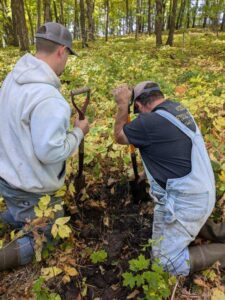
Tyler’s grandfather Ernest Hering used to hunt wild ginseng that grew in southeastern Minnesota’s river banks. Over time he and a friend collected seeds that they planted back in their own woods.
AN UNEXPECTED APPRENTICESHIP
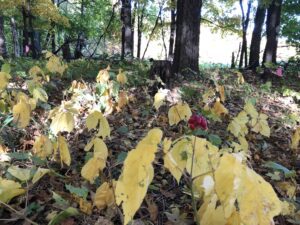 Tyler started working with ginseng by going out into the woods each fall with his grandfather to transplant roots and select which ones to harvest. Tyler learned how to clean and dry the roots to prepare them for sale—often to destinations in New York City and San Francisco.
Tyler started working with ginseng by going out into the woods each fall with his grandfather to transplant roots and select which ones to harvest. Tyler learned how to clean and dry the roots to prepare them for sale—often to destinations in New York City and San Francisco.
“I enjoyed the time outside, but it seemed like a lot of work at the time,” reflects Tyler. “I never thought that someday I wanted to be the one growing ginseng in our woods.”
Every year Tyler assumed more responsibility with the process. He valued being involved. Accompanying his grandfather on a sales trip during his senior year of high school brought the whole cycle of the process to life. “I really enjoyed meeting the buyers. I got to meet so many people and hear their stories about what they do with our ginseng. Then I was really in.”
TURNING LOCAL
After that trip, Tyler and his grandfather planted a new ginseng field on his dad’s dairy farm. His grandfather told Tyler that that was his woods, so Tyler was fully responsible for the care of those new plants. When those roots were ready to harvest in 2020, the sales trips with national and international buyers were not possible due to the COVID-19 pandemic.
Looking locally for new customers, they applied to the Minneapolis Farmers Market. They’ve been there regularly ever  since educating market visitors about ginseng and sharing their harvest in both whole roots and ground powdered form.
since educating market visitors about ginseng and sharing their harvest in both whole roots and ground powdered form.
Establishing Ty’s Ginseng means that their harvest goes directly to their consumers rather than being brokered through a middleman. From that initial woods created with his grandfather, Tyler now manages five fields. “I never really inherited his ginseng,” explains Tyler. “I inherited the knowledge. We started from scratch on the whole growing of the ginseng for our new business.”
WORTH THE WAIT
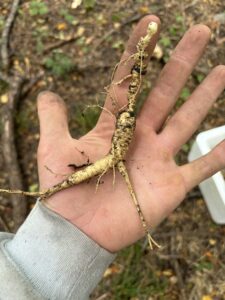 Roots are typically at least six years old before being dried and processed into powder, the most typical way that people use the prized root. The longer it grows, the stronger its potency. Ginseng plants thrive in shaded conditions, making them an ideal agroforestry crop. A drought resistant plant, dry summers make for steady growing conditions. Winters without snow cover, however, pose a challenge as turkeys and other critters dig up the plants.
Roots are typically at least six years old before being dried and processed into powder, the most typical way that people use the prized root. The longer it grows, the stronger its potency. Ginseng plants thrive in shaded conditions, making them an ideal agroforestry crop. A drought resistant plant, dry summers make for steady growing conditions. Winters without snow cover, however, pose a challenge as turkeys and other critters dig up the plants.
“It’s still hard even with our combined 70 years of experience,” states Tyler. “Every year we have a new challenge. It’s like, why did those seeds not sprout? Why did this section not come up this year? Or why are they only coming up like this? You have to be patient and wait. Your plans go through a lot in the six to seven years that it takes for the roots to be ready.”
Even after harvest, timing is key. Depending on their size, roots take three to five weeks to dry under controlled conditions. Tyler and his family process all the roots in a commercial kitchen so that their powder can be sold in retail locations.
“We’re small and we’re learning,” says Tyler. “We take a lot of pride in what we do. We don’t rush things. We want to try to get the best ginseng root possible.”
GROWING WITH RBIL
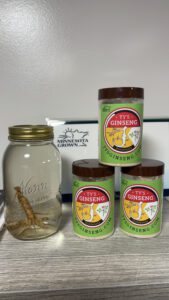
Ty’s Ginseng is a member of the 2025 cohort of the Rural Business Innovation Lab. RBIL is a cohort-based, entrepreneurial program that redefines the narrative of rural decline. Each cohort builds a peer network dense with ideas, expertise, and resources that help rural small businesses start and scale their work within their communities.
Working in both Minnesota and Wisconsin, RBIL supports rural businesses in their growth to become sustainable drivers of economic health.
The desire to make Ty’s Ginseng a sustainable business for his family made Tyler think that RBIL’s entrepreneurial program could pull them closer to their goals. “Meeting with the coaches gives me a different head space, a different perspective on how we could be marketing and selling our ginseng,” explains Tyler. “It’s amazing to have the reassurance of talking with someone who knows about the bigger picture and helps you sort through the possibilities for
moving your business forward.”
Working with other businesses has a huge impact too. “Working with the farmers market and selling direct to consumers is a whole new way of creating a business. Just being able to get new ideas and share them with the other members of the cohort has been so good for us.”
MINNESOTA GROWN GINSENG
Find Ty’s Ginseng each summer at the Minneapolis Farmers Market or order direct at www.tysginseng.com
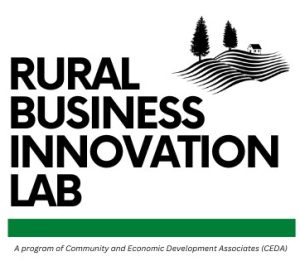
Follow along in the shaded fields on Facebook and Instagram.
Contact Cameron Payne cameron.payne@cedausa.com at RBIL to learn more about the program. Visit https://www.cedausa.com/ruralinnovation/ for a program overview.
Follow Meet the Minnesota Makers @meettheminnesotamakers on Ambit, Facebook, Instagram, and LinkedIn.
This story was originally published to Meet the Minnesota Makers and is shared with permission. The link to the original article can be found here.

